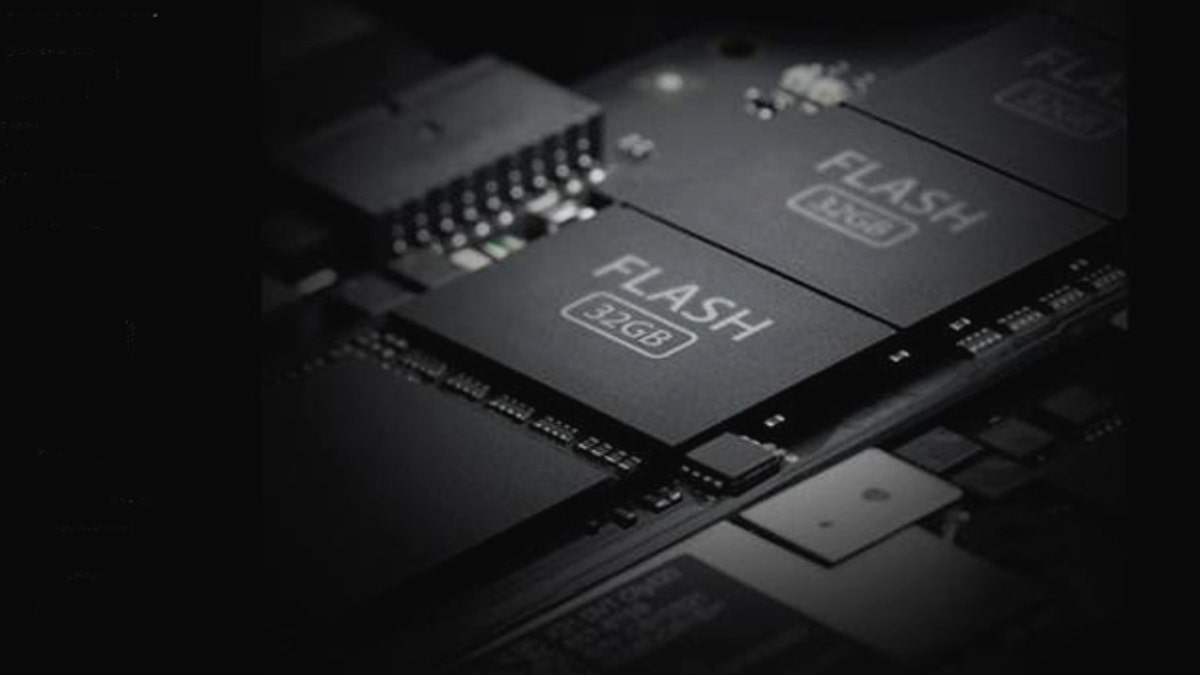
A screen capture of Apple's website highlights the flash memory within the new MacBook Air, chips that allow the laptop to boot in mere seconds. (Apple)
LOS ANGELES/SAN FRANCISCO – Want to make your PC faster? Ditch that old hard drive.
Apple's newest MacBook Air laptop boots up in mere seconds, thanks to its use of advanced flash memory instead of a standard, slower hard drive. And that memory format, used in so-called solid-state drives, could soon become a standard in PCs, as manufacturers follow Apple's lead and warm to the benefits of flash storage.
Increasingly used in smartphones, the chips used in flash storage are still expensive -- but market leaders Samsung Electronics, Toshiba, SanDisk and Intel are investing billions of dollars in cutting-edge facilities to boost production.
That will help meet growing demand and make solid-state drives, which are made of flash memory chips instead of mechanical parts, more mainstream by 2012 as prices decline, analysts say. Game fans and other tech-savvy consumers are increasingly buying off-the-shelf solid-state drives, or SSDs, because they are quicker, more rugged and less prone to fail.
Intel lowered the prices of some of its solid-state drives on Friday ahead of the Christmas shopping season. Its suggested retail price for an 80 gigabyte drive is now $199, down from around $225.
Some of the first netbooks shipped in 2008 included small SSDs but they were mostly discontinued after consumers balked at paying higher prices for less storage than they would have had in traditional hard drives.
But that could change after Apple Chief Executive Steve Jobs unveiled a new MacBook Air last month that comes with solid-state storage, a major vote of confidence in the technology.
"If the big issue is changing the consumer mind-set, then Steve Jobs has the clout to have initiated that process," said Jim Handy, a semiconductor expert at market research firm Objective Analysis.
Apple is expected to buy a third of all NAND chips manufactured next year.
STILL PRICEY
Less than 1 percent of laptops ship with SSDs, but by 2014 that is expected to rise to 10 percent, said Jeffrey Janukowicz, a flash storage analyst with IDC.
The main drawback to SSDs is cost, which has fallen but is still equivalent to $2 per gigabyte, according to IDC. Storage on a hard drive, which uses metal disks and a needle to store data, costs the equivalent of under 12 cents per gigabyte.
"The SSD doesn't necessarily have to match the hard drive, it just has to be within the ball park," said Richard Shim, a PC analyst at research firm IDC. "That may be a couple years before it happens, but it's getting there."
Shim said that in the wake of Apple's plans for the MacBook Air, other PC manufacturers will probably soon incorporate SSDs as standard features in some of their computer lines. Market research firm Gartner believes SSDs could start to become mainstream in 2012.
"You'll see good growth next year but it's not going to be wildly pervasive," said Gartner analyst Joseph Unsworth.
SanDisk is an obvious play for investors looking to benefit from the rise of SSDs because it is focused on NAND flash technology, but it is always at risk of price swings.
Companies making controllers that go into SSDs, such as LSI Corp and Marvell Technology Group, also stand to gain.
"I would characterize the NAND controller space as very good because it benefits from the unit growth of SSDs and is not likely to see the same type of volatility to pricing and margins that the raw memory guys will see," said Gleacher & Co analyst Doug Freedman.
Inexpensive, high-capacity hard drives are expected to store most of the world's digital data for several years to come, but market leaders Seagate and Western Digital are also investing in solid-state technology. Seagate expects to see meaningful revenue from SSDs in 2012.
Anticipating wider adoption, Toshiba this week unveiled a thin solid-state storage product for PC manufacturers called Blade X-gale, which some media have speculated could already be in the MacBook Air. Toshiba declined to comment. Apple has a policy of not revealing what parts are in its devices.
The SSD unit in the MacBook Air appears to be provided by Toshiba, according to iFixit, a company that does teardowns of consumer electronics.
Consumer electronics heavyweight Best Buy this year began selling SSDs made by Intel, but even with Friday's price cut they cost more than hard-disk drives with 10 times their storage capacity, a very tough sell to consumers unconvinced of their benefits.
"Is my mom buying one to put in her notebook or PC? Not yet, but the fact that we're selling at Best Buy, which caters to more of the mainstream here in the U.S., that's a positive sign," Intel Marketing Director Troy Winslow told Reuters.
